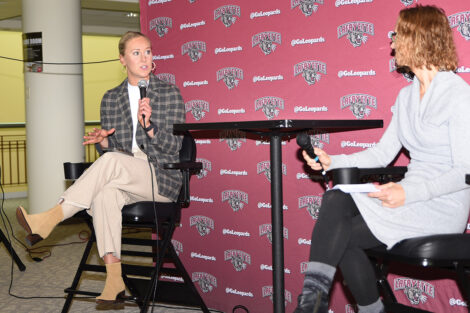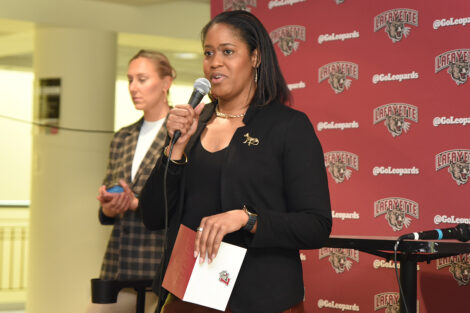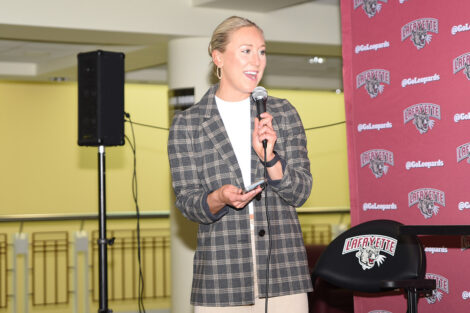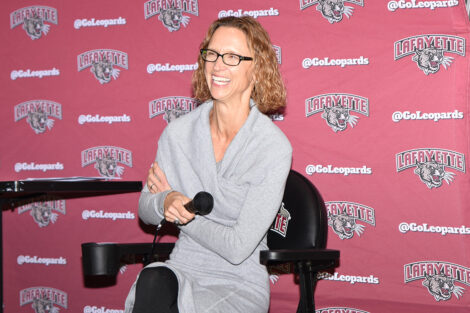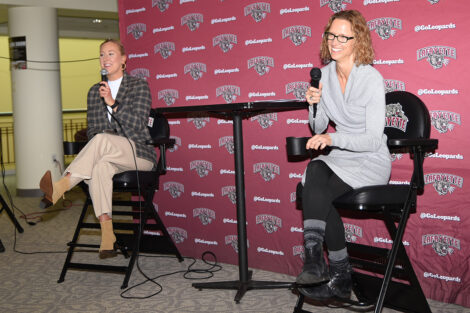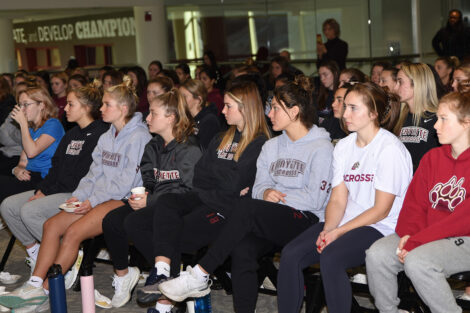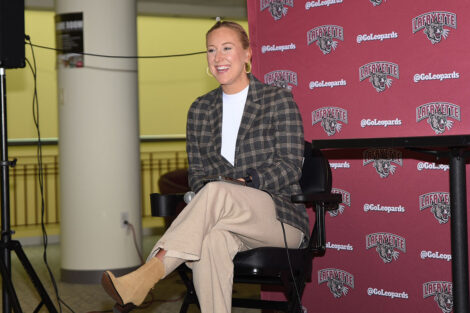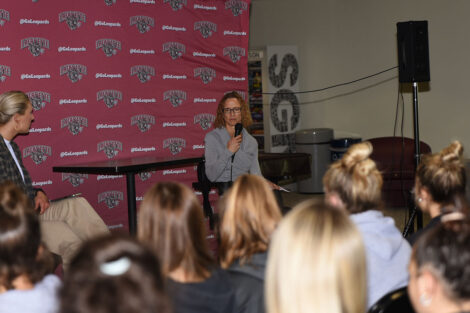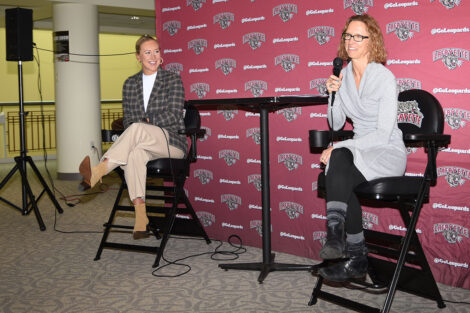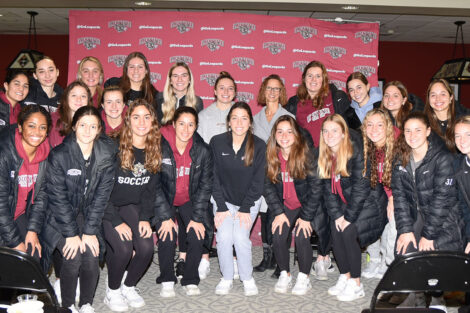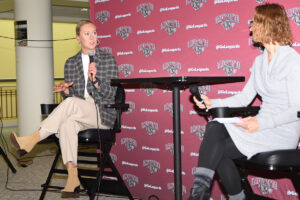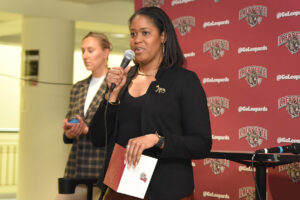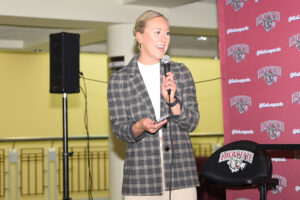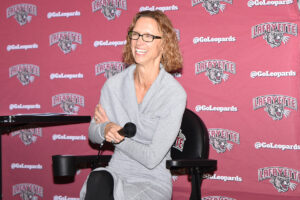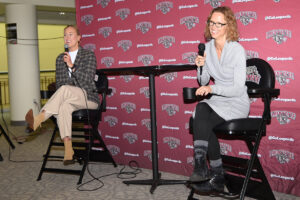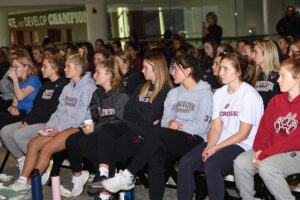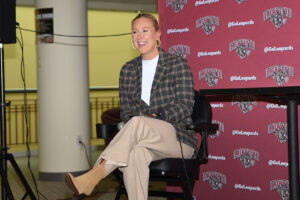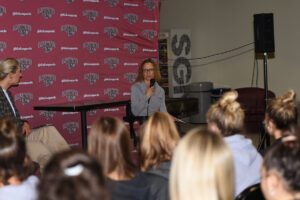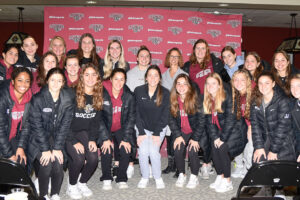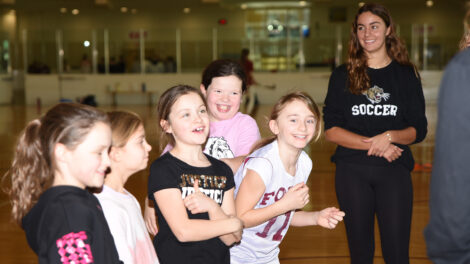Heidi Caruso Commins ’94 returns as ‘Trailblazer of Distinction’
By: Shannon Sigafoos
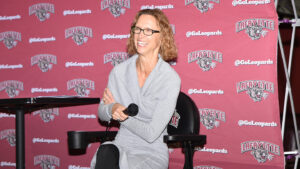 Lafayette College continued its celebration of the 50th anniversary of Title IX by welcoming Heidi Caruso Commins ’94, who last year was recognized by the Patriot League as a Trailblazer of Distinction, for a panel discussion centered around Title IX and its impact on her journey through sports and her professional career. In 1972, Title IX became a federal civil rights law prohibiting discrimination on the basis of sex in any type of federally funded education program or activity, including athletics.
Lafayette College continued its celebration of the 50th anniversary of Title IX by welcoming Heidi Caruso Commins ’94, who last year was recognized by the Patriot League as a Trailblazer of Distinction, for a panel discussion centered around Title IX and its impact on her journey through sports and her professional career. In 1972, Title IX became a federal civil rights law prohibiting discrimination on the basis of sex in any type of federally funded education program or activity, including athletics.
Commins, a two-sport alumna and Maroon Club Hall of Fame selection, held NCAA basketball records for steals in a game (14), career (532), and season (168), and also recorded 63 goals and 17 assists in a 69-game soccer career. Currently an emergency medicine physician at Abington-Lansdale Hospital and a flight doctor in the Air National Guard, Commins visited campus during a day of events celebrating National Girls and Women in Sports Day. The panel kicked off at 9:30 a.m, and Commins also was honored later in the afternoon during the women’s basketball victory over Colgate.
The panel, which was moderated by Meghan Caffrey, gave Commins the opportunity to discuss how Title IX shaped her own experiences as a collegiate athlete, as well as how she learned from both successes and failures–and carried those lessons into medical school and beyond.
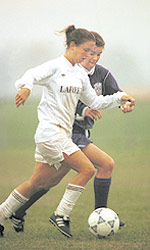 Prior to the enactment of Title IX, Commins recalled that there were few opportunities for girls and women in the sports community, and she arrived at Lafayette during a time when soccer was just transitioning from a club sport to a varsity sport. A self-professed tomboy growing up, Commins had grown used to playing co-ed sports straight through 10th grade. Her first realization that times were changing was when her high school started a girls’ soccer program as she began grade 11–but she had no idea, at the time, how much the push toward federal legislation would, or could, truly alter her trajectory moving forward.
Prior to the enactment of Title IX, Commins recalled that there were few opportunities for girls and women in the sports community, and she arrived at Lafayette during a time when soccer was just transitioning from a club sport to a varsity sport. A self-professed tomboy growing up, Commins had grown used to playing co-ed sports straight through 10th grade. Her first realization that times were changing was when her high school started a girls’ soccer program as she began grade 11–but she had no idea, at the time, how much the push toward federal legislation would, or could, truly alter her trajectory moving forward.
“I enjoyed playing with the boys. When I was growing up, of course, everything with kids was co-ed, and I think it helped me a bit. Getting the girls’ program started [in grade 11] was good timing because the boys were starting to outsize me. Playing with boys, however, I think you learn grit. They did not shy away from treating me the same–at practices I was just a teammate, and I had to keep up. I don’t think, in the moment, it was hitting me that this was anything unusual. I don’t remember second guessing it or thinking I would ever not play,” she shared. “For me, Title IX was always about women getting equal opportunities in education, and to prevent discrimination based on gender in athletics.”
Commins laughed when, during a Q&A portion of the panel, one student asked her which sport she liked better. She had been recruited by several other colleges for either soccer or basketball, but those coaches had expected a full commitment to only one sport. Not ready to give up on either basketball or soccer and fully enjoying both sports equally, she turned to Lafayette–which already had a strong basketball program at the time–and was thrilled to find a school that endorsed her desire to play both.
It was the start of carving her name in Lafayette Athletics lore–and was also an opportunity to begin learning a number of skills that she would find herself applying later in life.
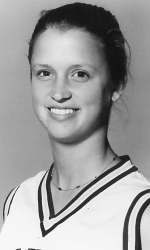 “Being a student-athlete is invaluable and teaches you leadership skills and how to be a teammate and work with others. It also teaches you time management and sacrifice,” she reflected. “The one really valuable thing is that it also teaches you failure–and when you fail, you have to get up and work harder. There’s no quitting. That’s valuable through life. I didn’t get into medical school right out of college, so I just tried harder. I went to grad school and got work experience in the medical field. You learn not to take no for an answer and work for what you want.”
“Being a student-athlete is invaluable and teaches you leadership skills and how to be a teammate and work with others. It also teaches you time management and sacrifice,” she reflected. “The one really valuable thing is that it also teaches you failure–and when you fail, you have to get up and work harder. There’s no quitting. That’s valuable through life. I didn’t get into medical school right out of college, so I just tried harder. I went to grad school and got work experience in the medical field. You learn not to take no for an answer and work for what you want.”
Throughout the panel, Commins alluded to times from her career–and even in her current role–where she finds herself in moments of being questioned as the woman in the room. As challenging as those situations have been, Commins has drawn on what she learned as a teammate in the world of athletics, and has learned to see herself as a leader and trust her own judgment so others see her as a leader as well.
“I’m in an emergency medical position working as part of a team all day long. The physician is the leader of that team. You have to rely on the team, or else you aren’t going to be successful. Being part of a team as an athlete is invaluable in that way, because I know I have to rely on the people around me. I was nominated to be chief resident, and maybe my colleagues saw in me that once you’re a leader, you’re always a leader. It definitely carries over. You’re confident and you can take charge, but you also need the people around you.”
With her parents in the room watching, and she, herself, a mother of two children starting to make their way in the world, Commins ended the panel by commenting on what she hopes the future holds in terms of doors opening for women.
“I think we’ve made great strides. I love seeing women in professional sports in other aspects. They’re coaching or refereeing men’s pro games, or they’re color analysts or commentators. It’s all positive and all going in the right direction. I think it’s only going to continue to improve in nonathletic and non-sports careers, as well. My daughter wants to go into engineering, and she doesn’t even question doing it. There are all these careers that used to be more male-dominated, and they aren’t anymore. It’s huge progress.”
